Scrophulariaceae
Showing 1–12 of 22 results
-
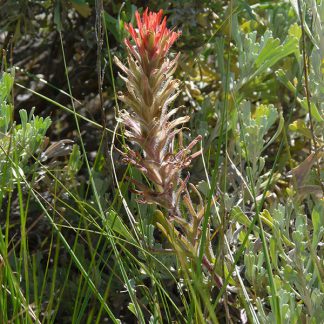
Castilleja covilleana / Rocky Mountain paintbrush
- clearly, one of the "Indian paintbrushes"
- early bloomer in the spring, even when quite short
- bright red, orange (sometimes yellow) bracts
- bracts and leaves have 3-7 deep lobes with long, soft hairs
- often grows in clusters
-
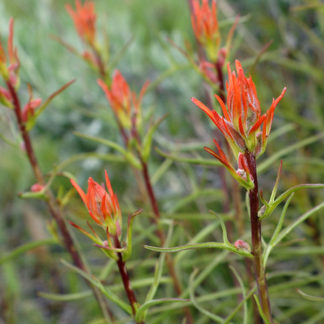
Castilleja linariifolia / Wyoming Indian paintbrush
- generally taller than most paintbrushes (up to 3 feet)
- very thin leaves, seldom lobed, seldom hairy
- red inflorescence bracts, may be lobed
- flowers extend well beyond bracts
- calyx is red and shorter than the corolla which is greenish yellow
- rocky areas with sagebrush and conifer forests
-

Castilleja miniata / scarlet paintbrush
- bright red, or orange or sometimes yellow bracts that are mistaken for flowers
- looks like a red feather duster, but only a few inches long
- generally low, and along streams or roadsides on hills where there is moisture
- leaves ovoid with prominent veins, no petioles
-

Castilleja spp. / paintbrushes
- vibrant, red (or yellow) inflorescence (bracts)
- widespread, but confusing... five or more species in the area
-

Castilleja spp. / two yellow paintbrushes
- look like Indian paintbrushes (which they are), but yellow
- inflorescence bracts possibly lobed
- height ranges from less than 8" to about 15"
- subalpine, alpine and tundra habitats, in clumps or spread out
- linear leaves without lobes, 3 prominent veins
- red to maroon, hairy stems
-

Collinsia parviflora / maiden blue-eyed Mary
- inconspicuous
- teeny blue and white flowers, singly or in small clusters
- reddish stems and buds more visible than the flowers
- wide variety of habitats, bare rocks to marshy fens
-
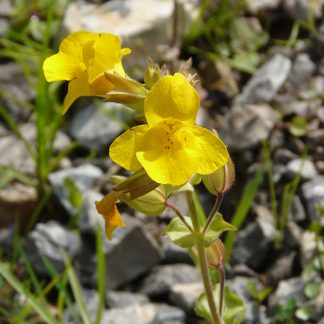
Erythranthe guttata / seep monkeyflower
- yellow flowers with red spots in clumps of 5 or more
- flowers large for the plant, but otherwise "normal" size
- two "lips" - lower lip larger than upper, each with 2 petals
- found in wetlands of all kinds
-
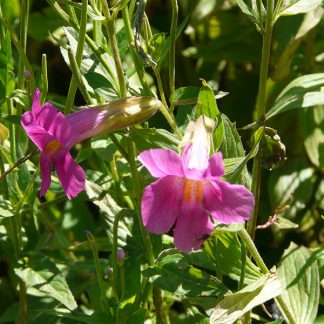
Erythranthe lewisii / Lewis’s monkeyflower
- pink to magenta with floral tube, two lips and yellow nectar guides
- usually stream-side in dense clumps
- striking
-

Linaria vulgaris / yellow toadflax
- fine, threadlike leaves, plants up to 3 feet tall
- flowers similar to snapdragon, pale yellow with orange lower lip, long spur
- flowers in tight terminal clusters
- plants typically in patches
- "noxious" weed in Idaho
-
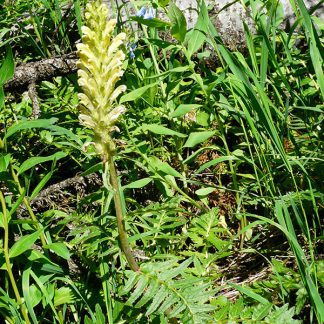
Pedicularis bracteosa / towering lousewort
- dense, narrow inflorescence on upper half of stem
- yellow, beak-like flowers with upper and lower lips
- flowers from bottom to top
- conspicuous, fern-like leaves
- old flowers become light brown but remain on stalk
-

Pedicularis groenlandica / elephant head
- flowers range from pink to purple or white
- flowers each have a long, pointed, upward curving beak like an elephant's trunk and lateral lobes that look like elephant's ears
- sharply-toothed fernlike leaves
- wet environments in late June, early July
-
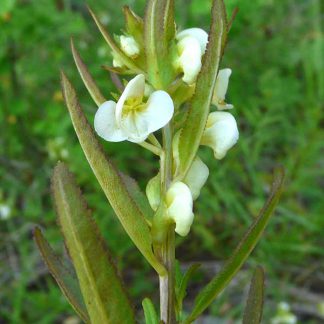
Pedicularis racemosa / leafy lousewort
- clumps of plants with maroon stems in forest understory
- white to pink flowers in upper leaf axils
- flowers have beak-like upper lip and wide three-lobed lower lip
- leaves narrow and tapering, slightly serrate, maroon when young
Showing 1–12 of 22 results